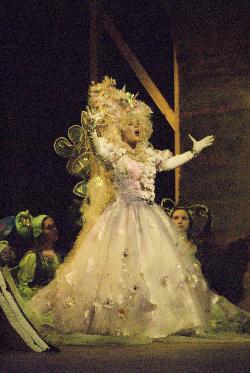The DVC theater department wants to set the record straight: The works of Shakespeare are not intimidating, boring, or in the least bit archaic.
The proof is in the department’s newest production, “A Midsummer Night’s Dream,” which opens tomorrow.
Director Nicole Hess-Diestler said she approached the play from a fresh and unexpected perspective, given most students’ attitudes towards Shakespeare.
“I really wanted to promote reading Shakespeare,” she said.
In fact, there will be special matinees on March 25, March 31 and April 3 for high school students.
Faced with the challenge of engaging an audience unfamiliar with Shakespeare, Hess-Diestler’s solution was to implement a number of modern twists to make the play more accessible.
The hardest challenges were the references.
“If someone’s never been to Athens, what would they envision?” she said
In fact, this concept is at the heart of the modern elements of the show.
One of Shakespeare’s most well-known comedies, “A Midsummer’s Night Dream” takes a complicated love triangle and douses it with a hilarious combination of mistaken identity and fantasy.
The story begins in Athens, Greece, where four friends face romantic challenges.
 Lovers Hermia and Lysander are forbidden to marry and decide to flee into the forest to be together.
Lovers Hermia and Lysander are forbidden to marry and decide to flee into the forest to be together.
Demetrius adores Hermia, who does not love him, and is instead plagued by the affections of Helena.
Resentful of Hermia’s good fortune, Helena informs Demetrius of Hermia’s plan hoping he will lose interest in her. To Helena’s dismay, he runs into the forest after Hermia and Helena follows.
The situation is further complicated when the four friends stumble into the fairy world and become entangled in a feud between the Fairy Queen and King.
Though written more than three centuries ago, the issues within this play are just as relevant today.
“[It’s about] the struggle of love, becoming your own person and making your own decisions,” said Cyle Swanstrom, assistant to the director. “These are real people with real problems.”
The actors have encountered challenges of their own, as well.
“It’s more difficult than modern English,” said theater major Juliet Paulson, 19, of the language of “Midsummer.” “You don’t make the same connections. It’s harder to memorize.”
Most of the actors, however, said the language was not a problem after they understood what their lines meant.
“It’s just another way of saying something,” explained Kelsey Stevenson, 20, an art history major.





































































